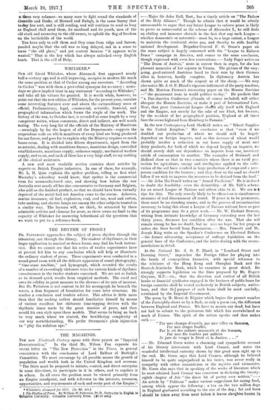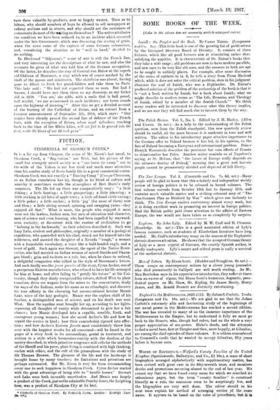THE MAGAZLNES.
THE new Nineteenth Century opens with three papers on "Imperial Reconstructisn." In the third Mr. Wilson Fox expands his recent letter on " The New Protection " in the Times, in general concurrence with the conclusions of Lord Balfour of Burleigh's Committee. Wo must encourage by all possible means the growth of population and wealth both in the United Kingdom and overseas. " The State must be prepared to initiate, control, and direct enterprise In some directions, to participate in it in others, and to regulate it in others. In all cases the position must be viewed primarily from an Empire standpoint, and with reference to the interests, resources, opportunities, and requirements of each and every part of the Empire:, • Whitaker's Almanaek for 1917. 13s. ed. net] t The Rhythm of Prose. By William St. Patterson, Ph.D., Instructor In English In (Plumb's University. Columbia University Frees. (.110 net.]
—Major Sir John Hall, Bart., has a timely article on " The Failure of the Holy Alliance." Though ho admits that it would be utterly unreasonable to argue that any future League to enforce peace is likely to prove as unsuccessful as the scheme of Alexander I., ho still finds
an abiding and immense obstacle in the fact that any such League— whether democratic or autocratic—must be, to a large extent, a League to maintain the territorial status quo, and thereby to stifle healthy
national development. Brigadier-General F. G. Stone's paper on the same subject is largely concerned with the " League to Enforce Peace " campaign in America, and comes to the same conclusion, though expressed with even less reservations.—Lady Paget writes on " The Doom of Austria," more in sorrow than in anger, for she has pleasant memories of her sojourn in Vienna. The picture of the easy- going, good-natured Austrians lured to their ruin by their German allies is, however, hardly complete. In diplomacy Austria has shown quite as much of the serpent as of the sheep.—We may also notice Mr. J. 0. P. Bland's vigorous indictment of the party machine, and Mr. Moreton Frewen's interesting paper on the Monroe Doctrine —" the paramount issue in world politics to-day." He predicts that " a Pan-America Conference (Canada of course included) will either abrogate the Monroe Doctrine, or make it part of International Law. Next, that great Commercial League shoffld ally itself with England and the Empire, not merely for the sake of our Fleet, but because, by the accident of her geographical position, England at all times bars the ocean highroad from Hamburg to Panama."
In the new Contemporary Lord Sheffield writes on " Wheat Supplies in the United Kingdom." His conclusion is that " even if we doubled our production of wheat we should still bo largely
dependent on foreign imports, and as this increase of wheat would probably involve a reduction in our home supply of meat and dairy products, for both of which we depend largely on imports, we should merely shift our dependence on imports from ono. necessary
article of consumption to another. Tho examples of Denmark and Holland show us that in two countries where there is no tariff pro- tection for agriculture, energy and intelligence applied to the culti- vation of the soil have resulted in large production of crops and a pros- perous condition for the farmers ; and they show us the road we should follow if we wish to improve the resources to be derived from the land." —Sir John MacDonell writcs on "Armed Pacifieism." He is inclined to doubt the feasibility—even the desirability—of Mr. Taft's scheme for an armed League of Nations and others akin to it. We are net ripe for this. The only remedy likely to be efficacious is simultaneous measures of real disarmament all round. If peace is to be permanent, there must be no standing armies, and in the process of reconstruction necessary to bring this about a League of Nations without force as part of its programme may do a great work.— — Mr. W. Harbutt Dawson, writing from intimate knowledge of Germany extending over the last
thirty years, discusses her condition after the war. That she will remain strong he has no doubt, but ho secs no hope for her progress unless she frees herself from Prussianism. Mrs. Fawcett and Mr.
Joseph King write on the Speaker's Conference on Electoral Reform —the former advocating acceptance of suffrage legislation on the general lines of the Conference, and the latter dealing with the recom- mendations in detail.
In the National Mr. J. 0. P. Bland, in " Lombard Street and Downing Street," impeaches the Foreign Office for playing into the hands of cosmopolitan financiers, with special reference to
the relations of the Hong Kong and Shanghai Bank and the Deutsch-Asiatische Bank, which he examines in great detail. He strongly supports legislation on the lines proposed by Mr. Rupert Gwynn, M.P.—viz., that the direction and control of all British banks or financial syndicates engaged in the business of public loans for foreign countries shall be vested exclusively in British subjects, native. born, and that they purpose of such loans 'shall be most carefully. scrutinized by the Imperial Government. Tho poem by M. Henri de Regnier which begins the present number
of the Fortnightly shows us by a flash, as only a poem can, the difference between England and France. Wo have to mourn our dead, but have not had to submit to the poisonous tido which has overwhelmed so much of France. The spirit of the nation speaks and thus makes
oath :— " Par mes champs ch:vast6s, par mes villes en Hammes, Par mes 6tages Par le cri des enfants massacres et des femmes, Par mes fits tombes par milliers Je jure de venger le Droit et la. Justice. . . ."
—Mr. Edmund Gosse writes a charming and sympathetic account
of his literary intercourse with Lord Cromer, and notes the wonderful intellectual curiosity shown by this great man right up to the end. Mr. Gosse says that Lord Cromer, although he believed
himself to be quite unprejudiced in his tastes, was never really in
sympathy with either romanticism or the mystics and visionaries. Mr. Gesso also says that in speaking of the works of literature which he most admired Lord Cromer was consistent in declaring tho twenty- eighth chapter of Job " the finest bit of poetry over written."— An article by " Politicus " makes various suggestions for saving food, among which appear the following : a tax on the two million dogs
in England graduated according to the size of the dog ; fat and bone should be taken away from meat before it leaves slangbter-houses tQ
save these valuable by-products, now so largely wasted. Then as to labbur, why should numbers of boys be allowed to sell newspapers at railway stations and in streets, and why should not the customers of restaurants do most of the waiting on themselves ? The writer attributes the condition we have been reduced to, to an incident 'which occurred tinder the late Government., which was discussing the storing of grain, when the news came of the capture of some German submarines, and, considering the situation to be " well in hand," decided to do nothing.
In Blackwood " Odysseus's " scene of war is still the French line, and very interesting are the descriptions of what ho saw, and also the accounts he gives of what was told him of the German occupation. Of the latter, he describes the stay of General von Billow at the superb old Chateau of Montmort, a stay which was of course marked by the theft of the spoons and miniatures. The cluitelaine was absent, having gone to Albert to fetch her grandchildren and take them to Paris. This lady said : " We had not expected them so soon. But had I known, I should have met them there on my doorstep, as my• father I id in 1870. ' You see,' she adds, with a smile that is half proud, half wistful, ' we are accustomed to such incidents ; our home stands upon the highway of invasiclik' " After this we get a detailed account of the burning of the Cathedral of Reims, and an extract from a German announcement of September 5th, 1914, which says : " Our armies have already passed the second lino of defence of the French forts, with the exception of Reims, whose royal splendour, reaching hack to the time of the White Lilies, will not fail to be ground into the dust, under the blows of our 16-inch guns."



































 Previous page
Previous page